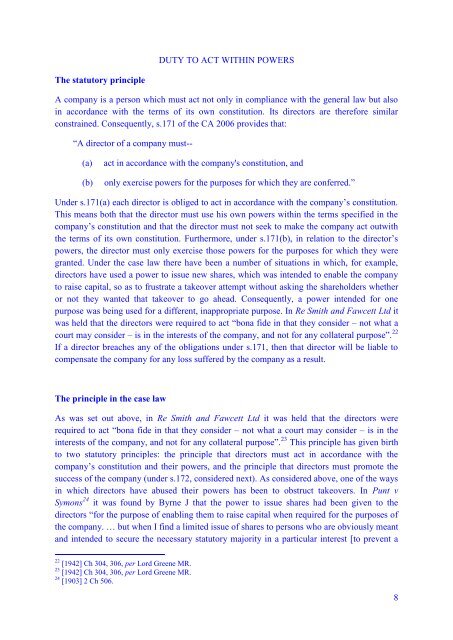Chapter 7 Directors' Duties - alastairhudson.com
Chapter 7 Directors' Duties - alastairhudson.com
Chapter 7 Directors' Duties - alastairhudson.com
Create successful ePaper yourself
Turn your PDF publications into a flip-book with our unique Google optimized e-Paper software.
The statutory principle<br />
DUTY TO ACT WITHIN POWERS<br />
A <strong>com</strong>pany is a person which must act not only in <strong>com</strong>pliance with the general law but also<br />
in accordance with the terms of its own constitution. Its directors are therefore similar<br />
constrained. Consequently, s.171 of the CA 2006 provides that:<br />
“A director of a <strong>com</strong>pany must--<br />
(a) act in accordance with the <strong>com</strong>pany's constitution, and<br />
(b) only exercise powers for the purposes for which they are conferred.”<br />
Under s.171(a) each director is obliged to act in accordance with the <strong>com</strong>pany‟s constitution.<br />
This means both that the director must use his own powers within the terms specified in the<br />
<strong>com</strong>pany‟s constitution and that the director must not seek to make the <strong>com</strong>pany act outwith<br />
the terms of its own constitution. Furthermore, under s.171(b), in relation to the director‟s<br />
powers, the director must only exercise those powers for the purposes for which they were<br />
granted. Under the case law there have been a number of situations in which, for example,<br />
directors have used a power to issue new shares, which was intended to enable the <strong>com</strong>pany<br />
to raise capital, so as to frustrate a takeover attempt without asking the shareholders whether<br />
or not they wanted that takeover to go ahead. Consequently, a power intended for one<br />
purpose was being used for a different, inappropriate purpose. In Re Smith and Fawcett Ltd it<br />
was held that the directors were required to act “bona fide in that they consider – not what a<br />
court may consider – is in the interests of the <strong>com</strong>pany, and not for any collateral purpose”. 22<br />
If a director breaches any of the obligations under s.171, then that director will be liable to<br />
<strong>com</strong>pensate the <strong>com</strong>pany for any loss suffered by the <strong>com</strong>pany as a result.<br />
The principle in the case law<br />
As was set out above, in Re Smith and Fawcett Ltd it was held that the directors were<br />
required to act “bona fide in that they consider – not what a court may consider – is in the<br />
interests of the <strong>com</strong>pany, and not for any collateral purpose”. 23 This principle has given birth<br />
to two statutory principles: the principle that directors must act in accordance with the<br />
<strong>com</strong>pany‟s constitution and their powers, and the principle that directors must promote the<br />
success of the <strong>com</strong>pany (under s.172, considered next). As considered above, one of the ways<br />
in which directors have abused their powers has been to obstruct takeovers. In Punt v<br />
Symons 24 it was found by Byrne J that the power to issue shares had been given to the<br />
directors “for the purpose of enabling them to raise capital when required for the purposes of<br />
the <strong>com</strong>pany. … but when I find a limited issue of shares to persons who are obviously meant<br />
and intended to secure the necessary statutory majority in a particular interest [to prevent a<br />
22<br />
[1942] Ch 304, 306, per Lord Greene MR.<br />
23<br />
[1942] Ch 304, 306, per Lord Greene MR.<br />
24<br />
[1903] 2 Ch 506.<br />
8













